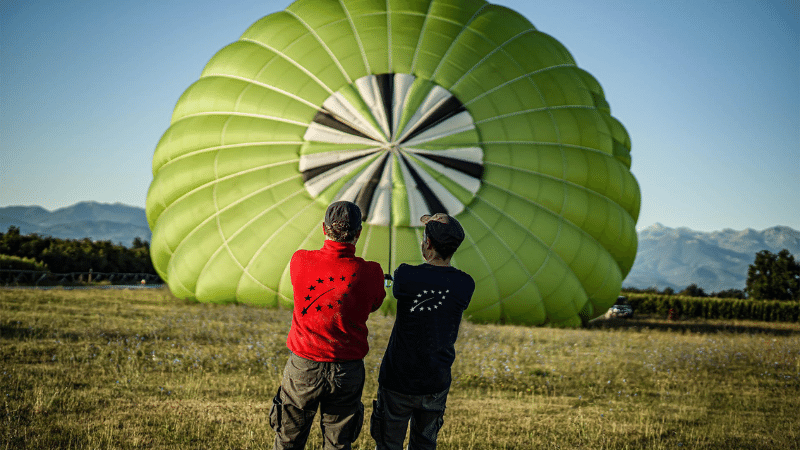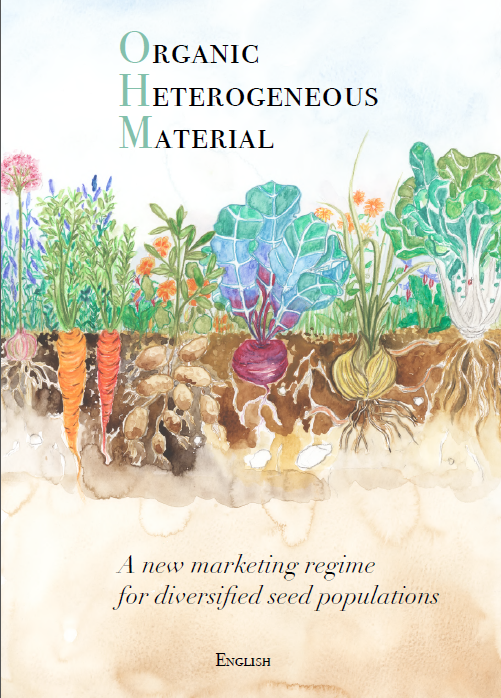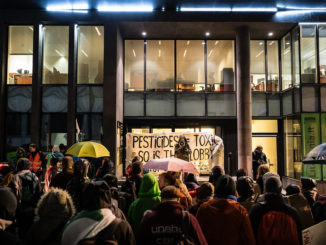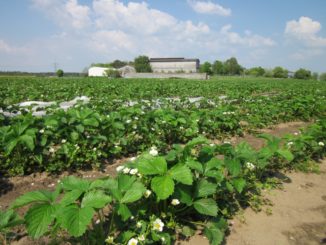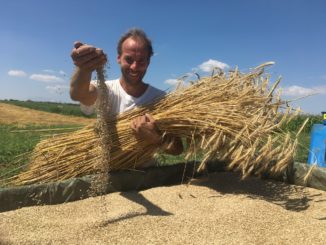The European Parliament recently proclaimed its support for organic farming and food, by an overwhelming majority. However, delving into the details a little, it turns out that our MEPs could be accused of offering pie in the sky – salvation via organic farming’s great sustainability performance some time in the future, provided no real significant changes are made in the here and now. Having introduced the text and its anodyne nature already, here we critically assess the language used line by line, to help decode the more hidden motivations behind the eurospeak.
Oliver Moore
Sometimes, the most obvious and direct things aren’t the only things worth focusing on. Sometimes, what’s not said, what’s included alongside other elements, and the implications that can be drawn from seemingly simple statements, sometimes these things matter too.
And so it is with the recent adopted text by the European Parliament on organic farming and food. Recently, we outlined what happened – nearly every MEP voted for it, but it was a fairly neutral, non-committal broad text which, if anything, reinforced the forces of business-as-usual (BAU) in their efforts to undermine the farm to fork. (Link below)
All Hot Air? An Organic Action Plan without Farm to Fork Targets
Below, we go through the opening ten lines of the general comments, to help you decode what’s really going on. Enjoy!
The truth, the whole truth and nothing but the truth
1.”Welcomes the Commission communication on an action plan for the development of organic production, the objective of increasing the EU’s agricultural area under organic farming by 2030 through the development of supply and demand, and the Commission’s recognition of organic farming as one of the main components on the EU’s path towards more sustainable food systems, using more sustainable agricultural practices, more efficient use of renewable sources, ensuring higher standards for animal welfare and helping to ensure higher revenues for European farmers”
Analysis: Here we see a classic in MEP speak – general long distance support is fine, just don’t ask us to back anything specific, with targets, which making change happen now.
So here, in this instance, we have everything but the targets from the Farm to Fork, biodiversity strategy, and overall EU Green Deal. In fact, its funny how much of the basic overarching content of the EU Green deal they have gotten in here, without the targets. Decode – we like nice things, just don’t ask us to support actually achieving them anytime soon.
To see how controversial the targets were in the first place, check out these two articles of ours from 2020 – we knew then that this was ongoing to be _the single most relevant thing_ and it has proven to be such.
Show Me The Numbers – Commission Holding Back on Specifics re Pesticides, Fertilizers and Organics
Farm 2 Fork and Biodiversity Strategies Hold Firm on Real Targets
2 “Calls on the Commission to carry out an impact assessment with regard to the share of the EU’s agricultural area under organic farming; considers that the development of organic farming, which delivers many positive externalities and benefits for climate change mitigation, biodiversity and soil protection, and will contribute to the achievement of the objectives of the farm to fork and biodiversity strategies; recognises, at the same time, the potential for other sustainable production models and farming methods, such as integrated production and biological control, to contribute to the Green Deal’s objectives”.
Analysis: This call for an impact assessment has been the main tool used by BAU forces to repel making progress towards organics, where investment is still chronically low compared to supposed plans for growth, as IFOAM EU revealed in its March 2022 report: IFOAMEU CAP_Strategic Plans
The Commission has already committed to evaluate each of the 37 measures of the farm to fork strategy. The pesticide reduction target for example, will be assessed for its impact.
There were few calls for impact assessment of emergency bailouts for the pigmeat sector, or of cancelling fallow land all over Europe, to allow for supposedly growing animal feeds, as a consequence of the war in Ukraine. However, once the actual targets came into the thinking of Farm to Fork, all the talk shifted to impact assessment.
So this reference here is to remind the Commission that despite the well chronicled climate and pollution issues with mineral fertilizers, despite the appalling performance of CAP according to the European Court of Auditors, despite all the immediate and emergency bailouts and deferral and derogations on offer, despite the clearest evidence imaginable that it is risky and war-implicating to reply on mineral fertilizers from Russia and Belarus – it is the Farm to Fork that need to be assessed. (and, as mentioned, its targets will be in any case).
And the semi-assessments that have occurred so far – did they take into account the impact of sudden war on fertilizer and feed inputs, and on food security? How did they manage externalities? Or did they just operate within a neo-liberal paradigm of like-for-like food replacement being the driving metric for comparison between organic and conventional? Without any dietary change, it will be difficult for organic and other approaches to ever compete with the yield from conventional, which by and large externalises its pollution costs. And yet, without this dietary change, to at least some degree, agri-food will not play its part in the necessary transition.
Literally everything else in this point is filler, to allow MEPs to keep BAU happy with another delaying tactic.
For more on metrics and organics, see here
Dear ECA – an Organic Love Letter to Mildly Misguided Auditors
3. “Underlines that the share of agricultural land under organic farming varies significantly among the Member States; stresses that this must be taken into account when developing policies and instruments aimed at enhancing organic production and urges the Commission to pay particular attention to supporting the Member States which are lagging behind;”
Analysis: fine.
4. “Insists that all measures and instruments proposed in this regard should be based on thorough analyses and impact assessments; is of the opinion that legislation and the OAPs must provide sufficient room for flexibility to take into account the differences in the nature and conditions of organic agriculture in the Member States;”
Analysis: See point two above. More delays while the current system drags us from crises to crises.
5. “Points out that, with the introduction of the new Regulation (EU) 2018/848 on organic production in 2022, the Commission must ensure an orderly and measured transition from the old EU organic legislation so that the organic sector can familiarise itself with the new rules quickly and reliably; calls on the Commission to carry out an impact assessment of the new regulation five years after its implementation, with a view to making any necessary adjustments;”
Analysis: fine, but also, here the organic industry has not exactly been enthusiastic and timely with its transfer over to the new regulation. There are many upgrades with the new organic regulation, which in many ways will be stronger than the old regulation, from an organic integrity perspective. this is no small achievement, considering the pressure legislators were under as organic goes more mainstream.
For example, the emerging rules on seeds in particular will help develop a genuine organic seed industry in Europe, which will in turn help agronomically with appropriate seeds for agroecological conditions. What’s not to love? Well, currently there is the option of applying for derogations to keep using conventional seeds where organic is not available – but how will an organic seed industry develop without largely phasing out the use of derogation?
Similar long term derogations have emerged for some feeds. For monogastrics (pigs, poultry), a stubborn small % of conventional feed is allowed in organic for pigs and poultry because there is supposedly a shortage of supply, despite multi million euro projects to develop the monogastric feed sector. And it holds for aquaculture too – conventional small young fish are fed to certified organic fish in fish (factory) farms.
While there will always be a need for some level of life saving derogation opt-outs, in practice, feed and seed derogations have become so embedded now that the integrity of the sector needs to be replenished. We need to move past routinised derogations.
This regulation was already delayed by the longest debate in EU regulatory history, then by covid 19. However the new regulation should help transition organic away from this derogation based stagnancy.
More on the movement history of the new organic regulation – in force now since January 2022, finally, at these links. For more on the new seed rules, part of the new organic regulation, see Seeds4all and their great work, including the publication below, on organic heterogeneous materials.
Overall yes, let’s make sure its all working smoothly – but also, let’s get on with it, and accept that we need to phase out these stubborn derogations.
2019
2017
2014
2014
6. “Underlines that the development and growth of the organic sector and organic areas, as foreseen in the farm to fork strategy, with a key role in revitalising and maintaining vibrant rural areas, must be market-driven and accompanied by holistic supply chain developments, including processing, as well as policy measures to stimulate further supply and demand for organic food and to ensure consumer trust”.
Analysis: This is industry speak for markets not targets – i.e. yet more anti 25% organic by 2030 speak. And yet, despite the spin, whereby centre-right politicians welcomed the focus on markets not targets specifically, this point is actually better and more nuanced than has been messaged out by the European People’s Party (EPP) and cohorts. The point combines market, policy and systemic developments, including improved processing -not just markets. So its a sheep in wolf’s clothing, to invert a phrase.
7. “Emphasises that the combination of these approaches should allow balanced development, in line with the market’s ability to absorb organic production, in order to safeguard the future profitability of the organic market and organic farming in the EU”
Analysis. More market speak while the exposures, risks and damage of the conventional system continue unabated. This of course ignores the fact that true cost accounting would balance the price differential between organic and conventional considerably.
8. “Underlines the need, in this context, to remove excessive administrative burdens; stresses that the environmental benefits of organic farming should not only be supported by consumers of organic products willing to pay a higher price, but the CAP budget should also properly reward organic farmers for the specific public goods that they deliver through the protection of the environment and of natural resources, through the reduction of inputs and through supporting higher animal welfare standards;”.
Analysis: fine, but be aware that the new organic regulation does all of this, and yet has been delayed in coming in by an excessively long debate and then by covid 19. Its a pretty common to hear of ending administrative burdens, but concurrently, calls for exceptions, derogations and exemptions. The new organic regulation allows for, for example, group certification of farmers, which could certainly reduce administrative burdens. Higher CAP payments for organic farming, for public goods delivered while income is forgone and costs are incurred (the standard justification for setting making organic payments at the level they are at) would certainly help with developing the sector. The proof of real support of course, is in the payment levels set for organic farmers.
9. “Highlights that stimulating the agricultural sustainability and resilience of the EU food system should be a priority, and that organic farming is a key element for achieving environmental and climate objectives; considers that sustainable innovation in practices such as organic farming and, more broadly, agroecology can lead to greater diversity within farming systems;”
Analysis: fine, so pay for it. Set the organic payments at a higher rate, to compete with conventional. Make the polluter pays a reality. Listen the the European Count of Auditors on CAP and its failings, Listen to civil society on what’s still missing from CAP Strategic plans submitted, and adjust.
10. “Underlines that the co-existence of different farming systems is important, as diversity is key to food system security and resilience, and benefits sustainable development; points out that there is no single farming model that fits all countries and regions, and stresses that the benefits of the different sustainable farming models should be recognised;”
Analysis: this is the equivalent of saying All Lives Matter. So what if other approaches make some sense too? Organic is a very specific, legally protected full food system approach. Other approaches can also potentially make positive contributions, but few can compare to organic for legal watertightness. Approaches like regenerative agriculture and even agroecology are not codified in law – simply put, if you claim to be certified organic, and you aren’t you can be jailed. So why insert this here, if not to muddy the waters? Having said something nice about organic, the purpose of this point is to try to make it seem like all farming is more or less fine as is, and will be supported in perpetuity, however badly it performs in real terms.
Conclusion
That so many MEPs could agree on this text shows that it is indeed all things to all people. Reading a little closer, we see that the same fault lines are still in operation – and resistance to genuine agri-food transition is strong. Moreover, there appears to be a gap between the organic movement and organic industry – and who represents the movement these days anyway? If, somehow, in some very specific ways, the new organic regulation actually improves the integrity of the organic standard, this shows the movement manifests in mysterious ways – even in the corridors of the EU institutions. Similarly, 45,000 people filled in an online survey in 2013 which showed that people were ready for organics with stronger standards too. However blocks to real agri-food transition happen in many ways, and come from numerous angles. Nevertheless, and despite these barriers, the movement somehow grows, offering farmers and eater some hope for a better way to do food.
More
All Hot Air? An Organic Action Plan without Farm to Fork Targets

